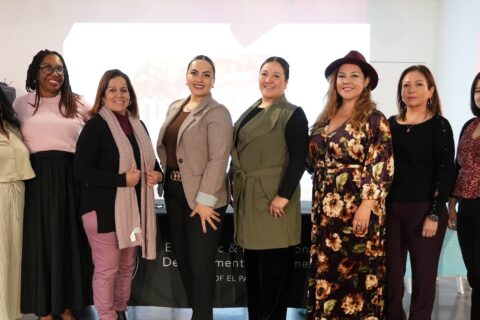Given the interconnected layers of their residents, municipalities looking to improve economic mobility must collaborate and coordinate on programming, policy and procedures. As a result, taking a holistic approach to economic mobility magnifies impacts. Read on to see some tidbits and insights from one of the City of Grand Island, NE’s economic mobility programs made possible by NLC’s Advancing Economic Mobility Rapid Grant.
Key Project in Grand Island, Nebraska: Community Kitchen Pilot Program
The city identified an opportunity to improve the economic mobility of its residents through strengthening its small food business environment. Utilizing a $20,000 rapid grant award from the Advancing Economic Mobility Rapid Grant program, the city was able to provide $2,000 in direct assistance and small business training to ten entrepreneurs who wanted to grow their food production businesses by creating the Community Kitchen Pilot Program.
The Community Kitchen Pilot program allowed entrepreneurs to expand their operations through activities such as renting a city-secured shared commercial kitchen space, purchasing supplies or creating marketing. Many of the materials, such as an easily accessible commercial kitchen space provided by the city, were a direct result of feedback from local business owners. By alleviating some of the typical challenges for local small businesses, the city positioned its food entrepreneurs for success.
As a part of the program, the entrepreneurs attended four training courses and received expert guidance from Central Community College Center of Entrepreneurship staff. The courses helped the entrepreneurs learn more about the nuances of owning and expanding their own small food production businesses. In addition to the courses, the city applied a cohort model to connect the entrepreneurs with their own mentor who would provide guidance on typical small food production business challenges. By combining education and networking connections, the entrepreneurs were able to immediately kickstart their businesses for future growth.
For the Community Kitchen Pilot participants, the direct assistance and training provided a springboard to expand and sustain their businesses. One of the participants scaled up their businesses through the acquisition of a brick-and-mortar storefront. Additionally, one of the participants won $10,000 through “Big Idea Grand Island” in which they pitched their business to a panel of judges and a live audience. Using their winnings and business expansion, the pilot participant started their own commercial kitchen space to support other small businesses.
Opportunities and Best Practices for Local Government
Local government leaders have a unique advantage that affords them the ability to see the connective tissue among disparate parts that can lead to building a broader coalition for greater impact.
- Integrate upward mobility activities into local government plans and strategies. Codifying your intention across various community plans helps to establish a shared and consistent community vision and mission.
- Engage underrepresented communities in designing solutions. Giving voice to audiences who are often underrepresented in most community decision-making processes helps to bring about other critical aspects of upward mobility such as dignity, belonging, power and autonomy.
- Using research and data tools can help pinpoint areas of focus and provide a way of measuring progress over time. Building a common language can go a long way in establishing common goals and shared narratives. The terms “economic mobility and opportunity” and “upward mobility” are relatively new. Although they are not regularly used as part of common local government nomenclature, they provide a way to articulate a broad range of initiatives intended to improve residents’ quality of life. “We use the data to make our case for all of our grant applications,” says Grand Island City Manager Laura McAloon. Grand Island Area Economic Development Corp has begun using the data from Opportunity Insights and the Urban Institute’s Upward Mobility Dashboard to help inform business recruitment efforts, demonstrating the versatility of the emerging tool.
- Mitigate excessive red tape to unleash community potential. Before proceeding with costly interventions and programs, consider which internal policies, procedures and fees can be modified to address potential barriers. To mitigate some of the biggest barriers to receiving financing and resources, Grand Island limited the eligibility requirements of the Community Kitchen Pilot program to just a few essential components: 1) that the entrepreneurs lived within city limits; 2) they focused on food manufacturing; and 3) the households made under 200% of the federal poverty line. “We have so many opportunities for economic growth and for people to take advantage of that, we just need to figure out how to deliver those services to our residents,” explains McAloon.
- Pool resources by collaborating with local businesses, schools and non-profits to create programs that support employment and educational access.
- Leveraging your position to raise awareness on upward mobility challenges and opportunities can help to attract private and philanthropic funding to support and expand programs and activities.
Moving Grand Island Forward
Want to learn more about Grand Island’s work? Explore the full case study on the International City/County Management Association (ICMA)’s website.





